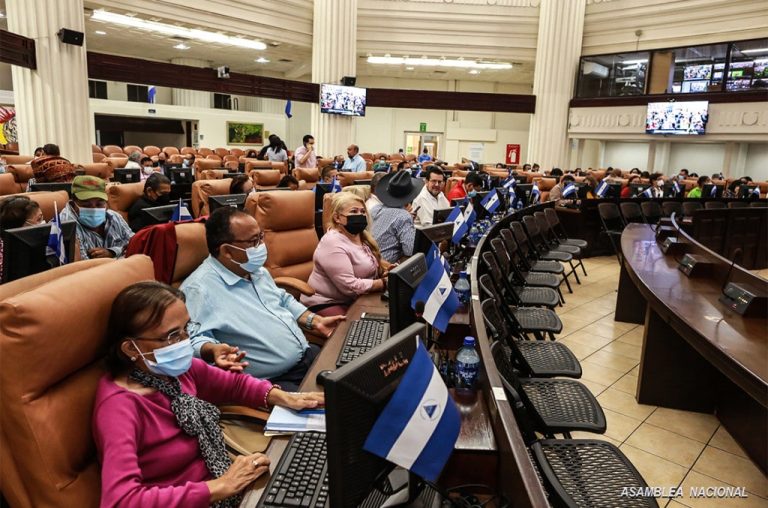3 de septiembre 2021

Dialogue and Elections: “The Peaceful Way Out of the Dictatorship”

PUBLICIDAD 1M
PUBLICIDAD 4D
PUBLICIDAD 5D
Besides giving him the power to confiscate assets, he can also leave banks leaderless administratively

The reform of the laws 587 (Capital Markets Law), 561 (General Law of Banks), and 316 (Law of the Superintendence of Banks and other Financial Institutions—SIBOIF), does more than just impose heavy fines and confiscations against companies and officials in the sector. In fact, it increases the discretionary power of the regime, to close any company regulated by those laws, including banks.
On August 24, the 70 FSLN deputies in the National Assembly approved without discussion the reform proposals that Daniel Ortega had sent to them a week before, requesting they be approved in an expedited process.
Although the wording of the three reforms seems to point in the direction of imposing high fines that may be dissuasive, an expert in banking law told Confidencial that what Ortega is doing is granting himself the authority to close banks or leave them leaderless if he prefers. Additionally, he can impose his own administrators while slandering the dismissed ones by making public the sanctions he levies.
“The reform to the General Law of Banks says that ‘the superintendent…may enforce…one or more of the following range of sanctions: temporary suspension of certain or all operations affected by deficiencies of the ML / FT / FP prevention program, or even the cancellation of the authorization granted…,” highlighted the expert.
The banking law expert added to that, “the temporary suspension of officials and employees...,” with which “they are saying that they can revoke permission to carry out any type of business, or even to close a bank, taking away their license, and leave its entire management leaderless, if he wants,” added the expert.
“The sanctions, which previously only affected the institution, are now transferred to the official, who can be fined up to six-months’ salary,” he explained.
In an extensive speech made after the approval of two of the three reforms, pro-government deputy Walmaro Gutierrez, tried to justify the need to put them into effect, indicating that they are necessary to comply with the indications that the International Financial Action Task Force of Latin America (GAFILAT), made to Nicaragua with regards to prevention of money laundering, financing of terrorism, and the proliferation of weapons of mass destruction.
“The prevention system has to do with trust in the legal framework that supports it. It is not only that there is a law, but that all stakeholders have confidence in complying with the national and international regulatory framework,” said an expert on money laundering prevention issues.
He added that “work is being done to strengthen the regulatory framework, in the existence of laws, but not in that people trust the prevention system.”
Not only banks will be threatened, but also “natural and legal persons who intervene directly or indirectly…in the securities markets,” as stipulated in the original text of Law 587, approved in November 2006, during the administration of President Enrique Bolaños.
“When the reform of the Capital Markets Law authorizes in article 188, subparagraph ‘d,’ the ‘final cancellation of the authorizations granted, if recidivism in very serious infractions is perceived,’ what it is saying is that they can take away the permission to carry out some type of business, or even close a bank, removing its license,” said the expert in banking law.
“They are the ones who determine what is a very serious cause. They do not even have to go to the courts, because ‘very serious’ is now something subjective. They could take away one, or all, authorizations, such as the one to issue credit cards, and if you use the writ of amparo, they can sanction you, taking away others,” he added.
As a specialist in the matter, he explained that “at this time, a bank can only be liquidated if it falls into an unsustainable financial situation, in such a way that even with additional investment it cannot be recovered or maintained in the system, but if they decide to close a bank, or a stock exchange company, the SIBOIF will appoint a liquidation board, and the bank could pass into the possession of those who they decide.”
When consulted, the senior executive of a company that is governed by these laws, said that it is true that this text grants the power to close banking, financial or stock market companies, but “there are administrative appeals that can be filed. It’s not just like that.”
Additionally, the expert in banking law highlighted that “when article 10, subparagraph 5 of the Superintendency Law states that it will approve “general rules that ensure the lawful origin of capital,” they are assuming to themselves the right to “make illegitimate” money that is clean, but also legalized dirty money or, at least, of suspicious origin.”
With subparagraph ‘f,’ of article 188 (which already was in the original text of the law), “they grant themselves the permission to slander, that is to say that they can make public reprimand, and publish them in a newspaper with wide circulation,” he explained.
Finally, he also rejected that the law allows them “to leave any bank without leadership, by appropriating the right to dismiss one or all of the managers of a company that is part of the system.”
The aforementioned executive acknowledged the existence of this almost absolute power, while emphasizing that “this is not new. It already existed as a discretionary power of the Superintendent. What is happening is that now they are extending it to other officials.”
According to the text of the reform -and the almost a posteriori defense that deputy Gutierrez made of them-, “the Superintendent will regulate the sanctions in such a way that they effectively and proportionally dissuade the continuation of an unlawful conduct…,” indicates the reformed article 164 of the General Law of Banks.
When trying to justify the reforms to the Capital Markets Law, and the General Law of Banks, the legislator said that the range of applicable fines (until prior to the reform approval) to those who operate in the stock market and who violate the law, is from 5,000 to 47,000 cordobas, which now forces them to increase, considering that “millions of dollars move in that market.”
He also praised the dissuasive factor, necessary “for them to think twice, and even three times, before using a bank to finance terrorism…to finance drug-trafficking…or to finance the proliferation of weapons of mass destruction; that they do not use a stock exchange position to finance this type of activity, which is completely at odds with the law, and affect society as a whole.”
Finally, he said that “to guarantee that the financial system continues to be a tool that will catapult Nicaragua’s economic growth and serve to strengthen and democratize access to credit to all productive sectors of this country, we need to have it sound, solid and reliable.”
This article was originally published in Spanish in Confidencial and translated by Havana Times
Archivado como:
PUBLICIDAD 3M
Periodista nicaragüense, exiliado en Costa Rica. Durante más de veinte años se ha desempeñado en CONFIDENCIAL como periodista de Economía. Antes trabajó en el semanario La Crónica, el diario La Prensa y El Nuevo Diario. Además, ha publicado en el Diario de Hoy, de El Salvador. Ha ganado en dos ocasiones el Premio a la Excelencia en Periodismo Pedro Joaquín Chamorro Cardenal, en Nicaragua.
PUBLICIDAD 3D